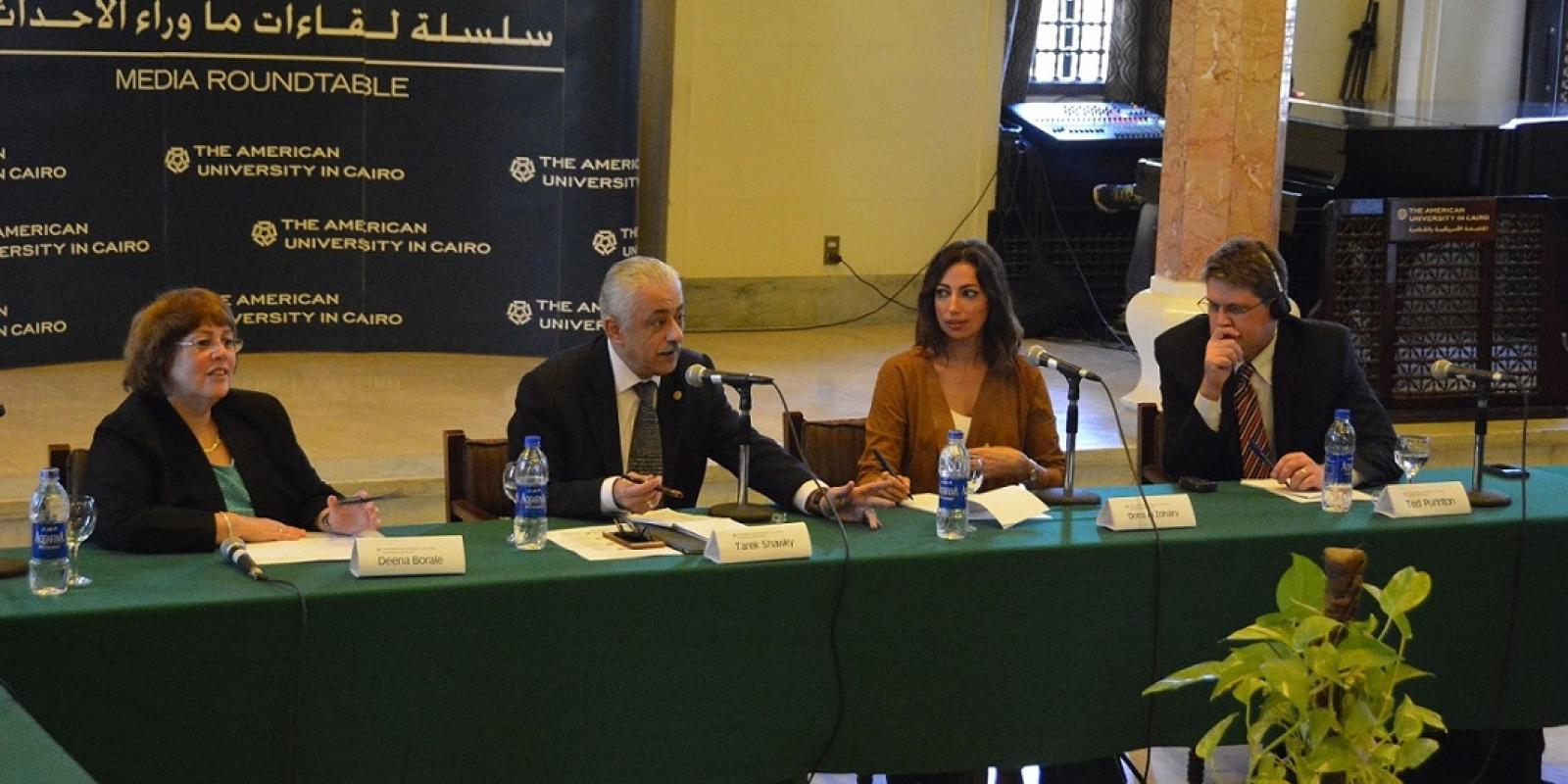
Faculty: Reform Requires Change in the Mindset of Educators, Youth
Education reform in Egypt requires a change in the mindset of educators and youth, and steps are already being taken in that direction, said Tarek Shawki, dean of AUC’s School of Sciences and Engineering, head of the country’s Presidential Specialized Council for Education and Scientific Research, and secretary-general of all presidential specialized councils in Egypt.
“For the past 50 years, the education system has been negatively affecting the creativity of Egyptian children and youth,” Shawki declared. “What we really need is a change of mindset to ensure that we have quality education. Through the specialized councils, we are currently working on different, multifaceted projects, and a change is expected in the coming years.”
Shawki spoke as part of a faculty panel in the media roundtable discussion series, Behind the Headlines. The panel, titled “Education for Life: Enhancing the Knowledge, Skills and Competencies of Egyptian Youth,” also featured Deena Boraie, dean of AUC’s School of Continuing Education, professor of practice and the assessment adviser for Egypt’s Presidential Leadership Program; and Ted Purinton, dean of AUC’s Graduate School of Education. The discussion was moderated by AUC alumna Doha Al Zohairy, presenter in Al Arabyia Al Hadath TV channel.
Shawki explained that Specialized Council for Education and Scientific Research is currently working on new initiatives that aim to equip youth with a wide range of skills, as well as the ability to think critically, analyze and solve problems. Specifically, four projects are currently underway: development of educators, which involves training in information and communication technology for 10,000 teachers; license to practice; a Presidential Leadership Program; and the Egyptian Knowledge Bank, a nationwide project aimed at providing all Egyptian citizens with open access to quality research and education materials. The knowledge bank will grant anyone with an Egyptian IP address free access to publications; journals; audio, video and image libraries; software and books from around the world.
“We are currently working on numerous projects in parallel and in a non-linear way in order to get better results,” said Shawki. “The education system in Egypt is currently not testing youth’s skills; rather, it is testing their ability to memorize. The ability to learn is a skill on its own, and that is what we are working on.”
With the Presidential Leadership Program, youth between 20 and 30 years old are given courses on administration, public opinion, human resources and the sciences that would provide them with practical job skills. “Young graduates need more than their university degrees,” said Boraie. “Many fresh graduates are shocked when they start working because they aren’t familiar with the real world experience and how the system works in the government, for example. So, this program trains them and provides them with skills that would enable them to not only perform, but also excel in their jobs.”
And the program has already made a successful kickstart, More than 52,000 people have applied, and computerized assessments have filtered that number to 5,000. In the pilot program, 500 candidates, distributed evenly across governorates and genders, will be accepted and trained through an eight-month government-funded program.
In addition to training youth, for education reform to be effective, teachers should be at the core of the process. As Purinton noted, teachers must be trained to put student learning and discovery at the center. “As the old Egyptian saying goes, you can’t give what you don’t have,” Purinton said emphasizing teacher training as an essential ingredient of the education reform process in Egypt. “Learners are different, youth think differently and that is why our teachers should go through preparation programs. The most effective teachers are the ones who will understand where the students are and what is their learning style.”
As head of the School of Continuing Education, which serves approximately 20,000 students from different parts of Egypt every year, Boraie emphasized that youth are striving for knowledge. “Seeing that many high school and university students are keen on taking courses to enhance their education is reflective of their eagerness to expand their knowledge,” she said. “Breaking the conventional style of learning from just a book and expanding the sources of information to other material, whether online or in libraries, are needed to create the required change in mindset.”
